Global Business Portfolio - Business Development Assignment
VerifiedAdded on 2022/12/15
|17
|5460
|206
Portfolio
AI Summary
This portfolio provides a comprehensive analysis of global business concepts, beginning with an examination of the European Economic Community (EEC), outlining its pros and cons. The portfolio then delves into the reasons behind the internationalization of Multinational Corporations (MNCs), exploring the motivations and challenges these companies encounter when expanding their operations across borders. Furthermore, the assignment includes an individual report that assesses how an MNC could enter a new international market, covering the analysis of the domestic market, strategies for internationalization, environmental analysis of a selected country, the mode of entry, potential challenges, and the required leadership qualities. Finally, the portfolio concludes with a reflective essay, summarizing the key learnings from the module and an assessment of the student's entrepreneurial qualities. This portfolio is a valuable resource for students studying global business and offers in-depth insights into key topics and concepts.
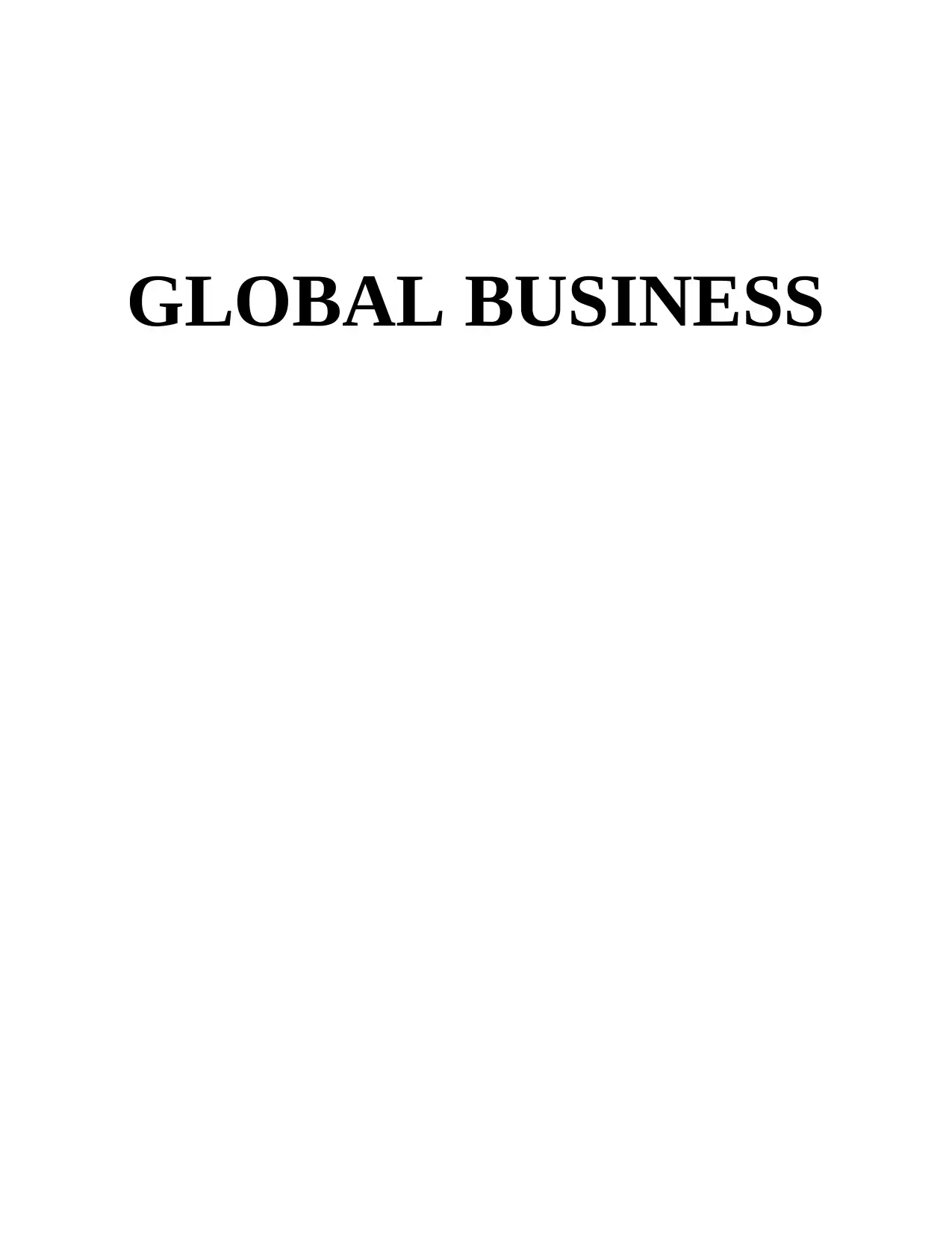
GLOBAL BUSINESS
Paraphrase This Document
Need a fresh take? Get an instant paraphrase of this document with our AI Paraphraser
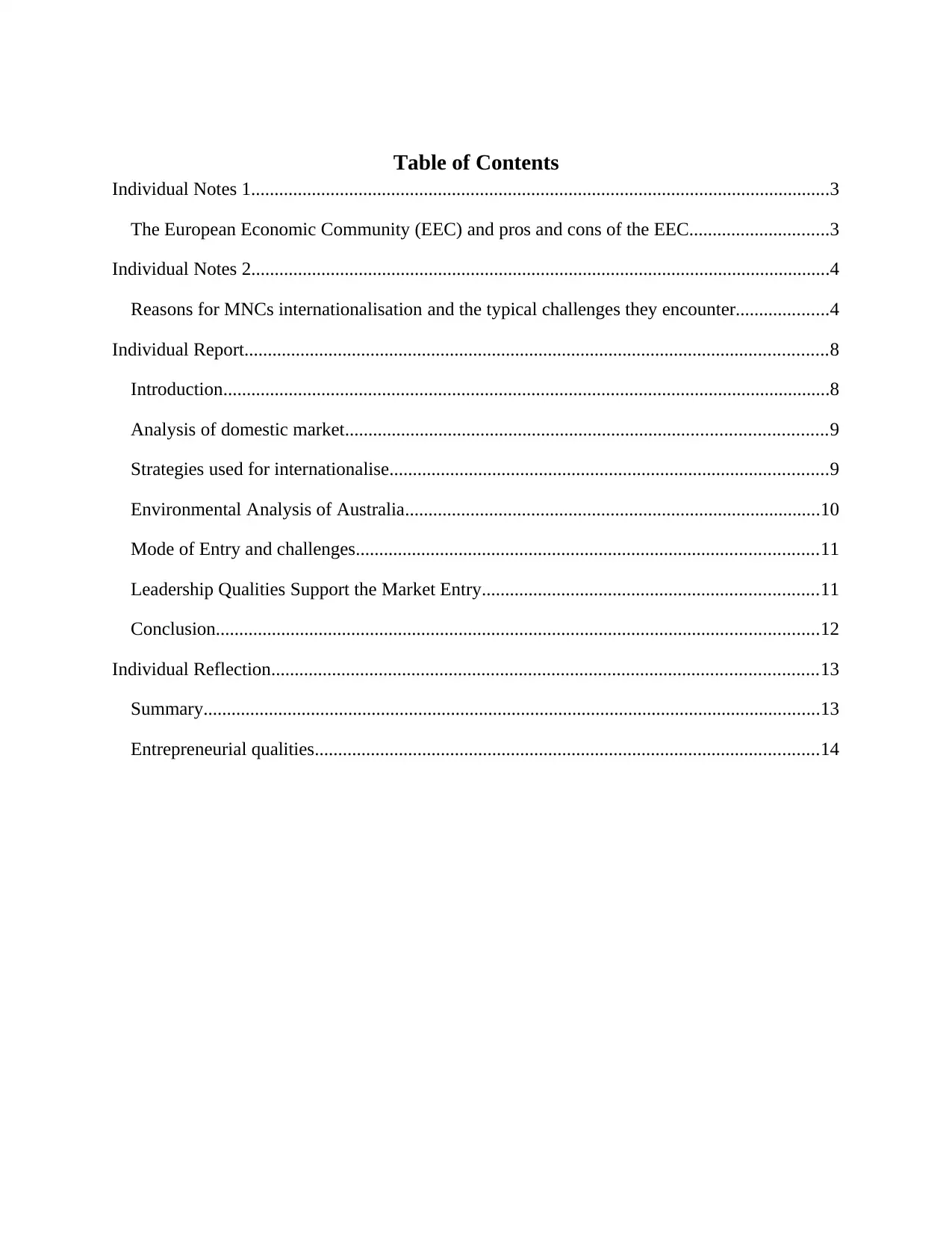
Table of Contents
Individual Notes 1............................................................................................................................3
The European Economic Community (EEC) and pros and cons of the EEC..............................3
Individual Notes 2............................................................................................................................4
Reasons for MNCs internationalisation and the typical challenges they encounter....................4
Individual Report.............................................................................................................................8
Introduction..................................................................................................................................8
Analysis of domestic market.......................................................................................................9
Strategies used for internationalise..............................................................................................9
Environmental Analysis of Australia.........................................................................................10
Mode of Entry and challenges...................................................................................................11
Leadership Qualities Support the Market Entry........................................................................11
Conclusion.................................................................................................................................12
Individual Reflection.....................................................................................................................13
Summary....................................................................................................................................13
Entrepreneurial qualities............................................................................................................14
Individual Notes 1............................................................................................................................3
The European Economic Community (EEC) and pros and cons of the EEC..............................3
Individual Notes 2............................................................................................................................4
Reasons for MNCs internationalisation and the typical challenges they encounter....................4
Individual Report.............................................................................................................................8
Introduction..................................................................................................................................8
Analysis of domestic market.......................................................................................................9
Strategies used for internationalise..............................................................................................9
Environmental Analysis of Australia.........................................................................................10
Mode of Entry and challenges...................................................................................................11
Leadership Qualities Support the Market Entry........................................................................11
Conclusion.................................................................................................................................12
Individual Reflection.....................................................................................................................13
Summary....................................................................................................................................13
Entrepreneurial qualities............................................................................................................14
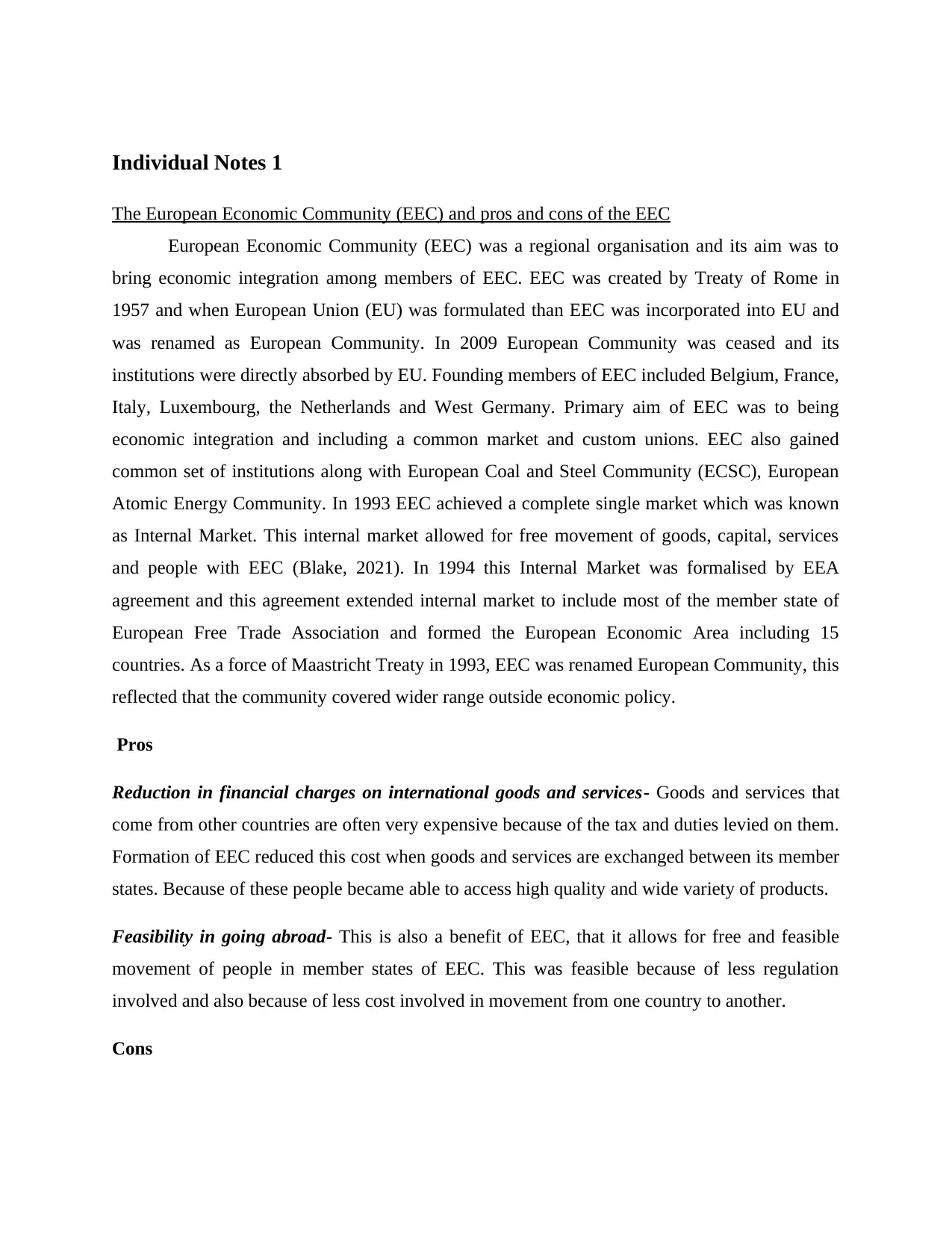
Individual Notes 1
The European Economic Community (EEC) and pros and cons of the EEC
European Economic Community (EEC) was a regional organisation and its aim was to
bring economic integration among members of EEC. EEC was created by Treaty of Rome in
1957 and when European Union (EU) was formulated than EEC was incorporated into EU and
was renamed as European Community. In 2009 European Community was ceased and its
institutions were directly absorbed by EU. Founding members of EEC included Belgium, France,
Italy, Luxembourg, the Netherlands and West Germany. Primary aim of EEC was to being
economic integration and including a common market and custom unions. EEC also gained
common set of institutions along with European Coal and Steel Community (ECSC), European
Atomic Energy Community. In 1993 EEC achieved a complete single market which was known
as Internal Market. This internal market allowed for free movement of goods, capital, services
and people with EEC (Blake, 2021). In 1994 this Internal Market was formalised by EEA
agreement and this agreement extended internal market to include most of the member state of
European Free Trade Association and formed the European Economic Area including 15
countries. As a force of Maastricht Treaty in 1993, EEC was renamed European Community, this
reflected that the community covered wider range outside economic policy.
Pros
Reduction in financial charges on international goods and services- Goods and services that
come from other countries are often very expensive because of the tax and duties levied on them.
Formation of EEC reduced this cost when goods and services are exchanged between its member
states. Because of these people became able to access high quality and wide variety of products.
Feasibility in going abroad- This is also a benefit of EEC, that it allows for free and feasible
movement of people in member states of EEC. This was feasible because of less regulation
involved and also because of less cost involved in movement from one country to another.
Cons
The European Economic Community (EEC) and pros and cons of the EEC
European Economic Community (EEC) was a regional organisation and its aim was to
bring economic integration among members of EEC. EEC was created by Treaty of Rome in
1957 and when European Union (EU) was formulated than EEC was incorporated into EU and
was renamed as European Community. In 2009 European Community was ceased and its
institutions were directly absorbed by EU. Founding members of EEC included Belgium, France,
Italy, Luxembourg, the Netherlands and West Germany. Primary aim of EEC was to being
economic integration and including a common market and custom unions. EEC also gained
common set of institutions along with European Coal and Steel Community (ECSC), European
Atomic Energy Community. In 1993 EEC achieved a complete single market which was known
as Internal Market. This internal market allowed for free movement of goods, capital, services
and people with EEC (Blake, 2021). In 1994 this Internal Market was formalised by EEA
agreement and this agreement extended internal market to include most of the member state of
European Free Trade Association and formed the European Economic Area including 15
countries. As a force of Maastricht Treaty in 1993, EEC was renamed European Community, this
reflected that the community covered wider range outside economic policy.
Pros
Reduction in financial charges on international goods and services- Goods and services that
come from other countries are often very expensive because of the tax and duties levied on them.
Formation of EEC reduced this cost when goods and services are exchanged between its member
states. Because of these people became able to access high quality and wide variety of products.
Feasibility in going abroad- This is also a benefit of EEC, that it allows for free and feasible
movement of people in member states of EEC. This was feasible because of less regulation
involved and also because of less cost involved in movement from one country to another.
Cons
⊘ This is a preview!⊘
Do you want full access?
Subscribe today to unlock all pages.

Trusted by 1+ million students worldwide
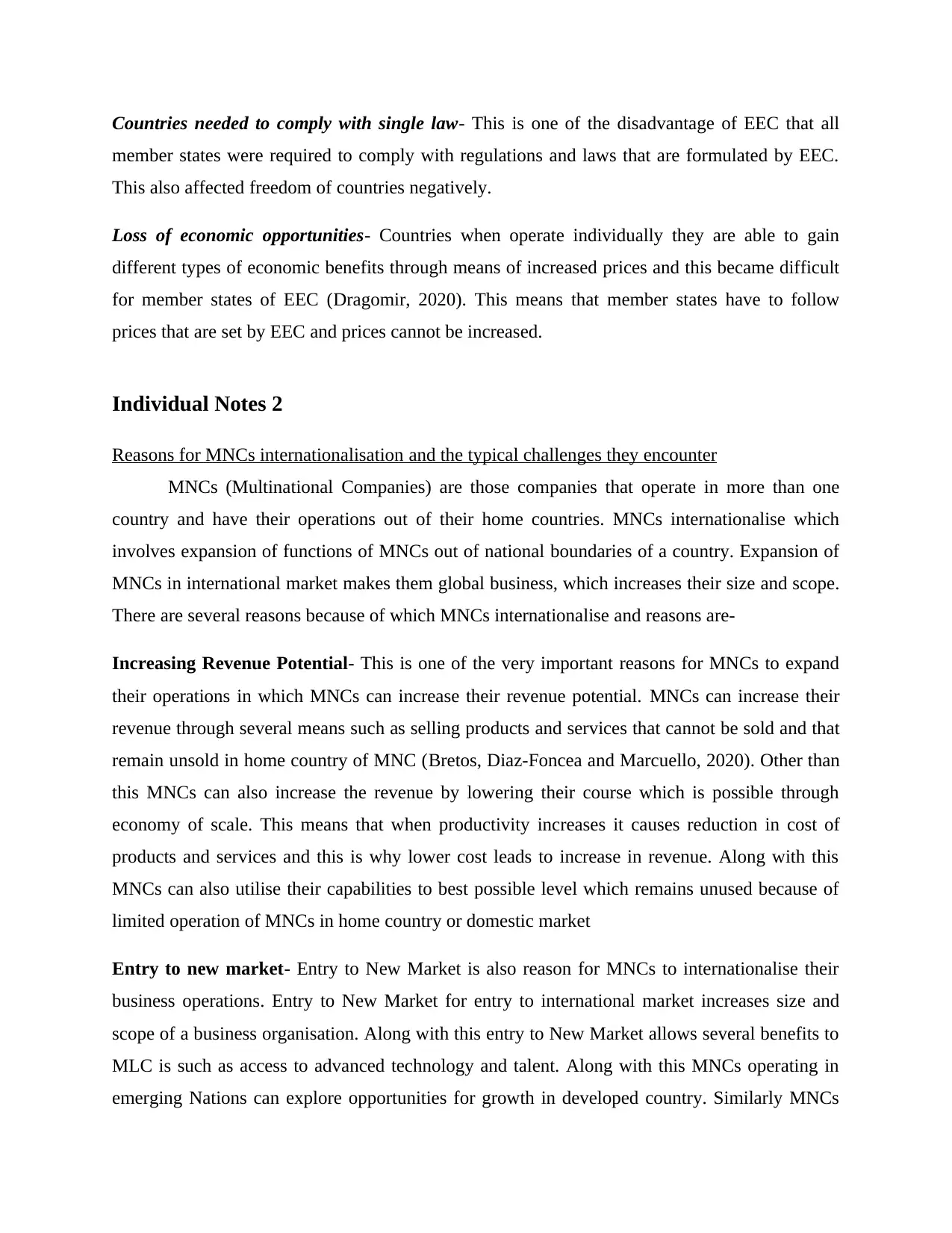
Countries needed to comply with single law- This is one of the disadvantage of EEC that all
member states were required to comply with regulations and laws that are formulated by EEC.
This also affected freedom of countries negatively.
Loss of economic opportunities- Countries when operate individually they are able to gain
different types of economic benefits through means of increased prices and this became difficult
for member states of EEC (Dragomir, 2020). This means that member states have to follow
prices that are set by EEC and prices cannot be increased.
Individual Notes 2
Reasons for MNCs internationalisation and the typical challenges they encounter
MNCs (Multinational Companies) are those companies that operate in more than one
country and have their operations out of their home countries. MNCs internationalise which
involves expansion of functions of MNCs out of national boundaries of a country. Expansion of
MNCs in international market makes them global business, which increases their size and scope.
There are several reasons because of which MNCs internationalise and reasons are-
Increasing Revenue Potential- This is one of the very important reasons for MNCs to expand
their operations in which MNCs can increase their revenue potential. MNCs can increase their
revenue through several means such as selling products and services that cannot be sold and that
remain unsold in home country of MNC (Bretos, Diaz-Foncea and Marcuello, 2020). Other than
this MNCs can also increase the revenue by lowering their course which is possible through
economy of scale. This means that when productivity increases it causes reduction in cost of
products and services and this is why lower cost leads to increase in revenue. Along with this
MNCs can also utilise their capabilities to best possible level which remains unused because of
limited operation of MNCs in home country or domestic market
Entry to new market- Entry to New Market is also reason for MNCs to internationalise their
business operations. Entry to New Market for entry to international market increases size and
scope of a business organisation. Along with this entry to New Market allows several benefits to
MLC is such as access to advanced technology and talent. Along with this MNCs operating in
emerging Nations can explore opportunities for growth in developed country. Similarly MNCs
member states were required to comply with regulations and laws that are formulated by EEC.
This also affected freedom of countries negatively.
Loss of economic opportunities- Countries when operate individually they are able to gain
different types of economic benefits through means of increased prices and this became difficult
for member states of EEC (Dragomir, 2020). This means that member states have to follow
prices that are set by EEC and prices cannot be increased.
Individual Notes 2
Reasons for MNCs internationalisation and the typical challenges they encounter
MNCs (Multinational Companies) are those companies that operate in more than one
country and have their operations out of their home countries. MNCs internationalise which
involves expansion of functions of MNCs out of national boundaries of a country. Expansion of
MNCs in international market makes them global business, which increases their size and scope.
There are several reasons because of which MNCs internationalise and reasons are-
Increasing Revenue Potential- This is one of the very important reasons for MNCs to expand
their operations in which MNCs can increase their revenue potential. MNCs can increase their
revenue through several means such as selling products and services that cannot be sold and that
remain unsold in home country of MNC (Bretos, Diaz-Foncea and Marcuello, 2020). Other than
this MNCs can also increase the revenue by lowering their course which is possible through
economy of scale. This means that when productivity increases it causes reduction in cost of
products and services and this is why lower cost leads to increase in revenue. Along with this
MNCs can also utilise their capabilities to best possible level which remains unused because of
limited operation of MNCs in home country or domestic market
Entry to new market- Entry to New Market is also reason for MNCs to internationalise their
business operations. Entry to New Market for entry to international market increases size and
scope of a business organisation. Along with this entry to New Market allows several benefits to
MLC is such as access to advanced technology and talent. Along with this MNCs operating in
emerging Nations can explore opportunities for growth in developed country. Similarly MNCs
Paraphrase This Document
Need a fresh take? Get an instant paraphrase of this document with our AI Paraphraser
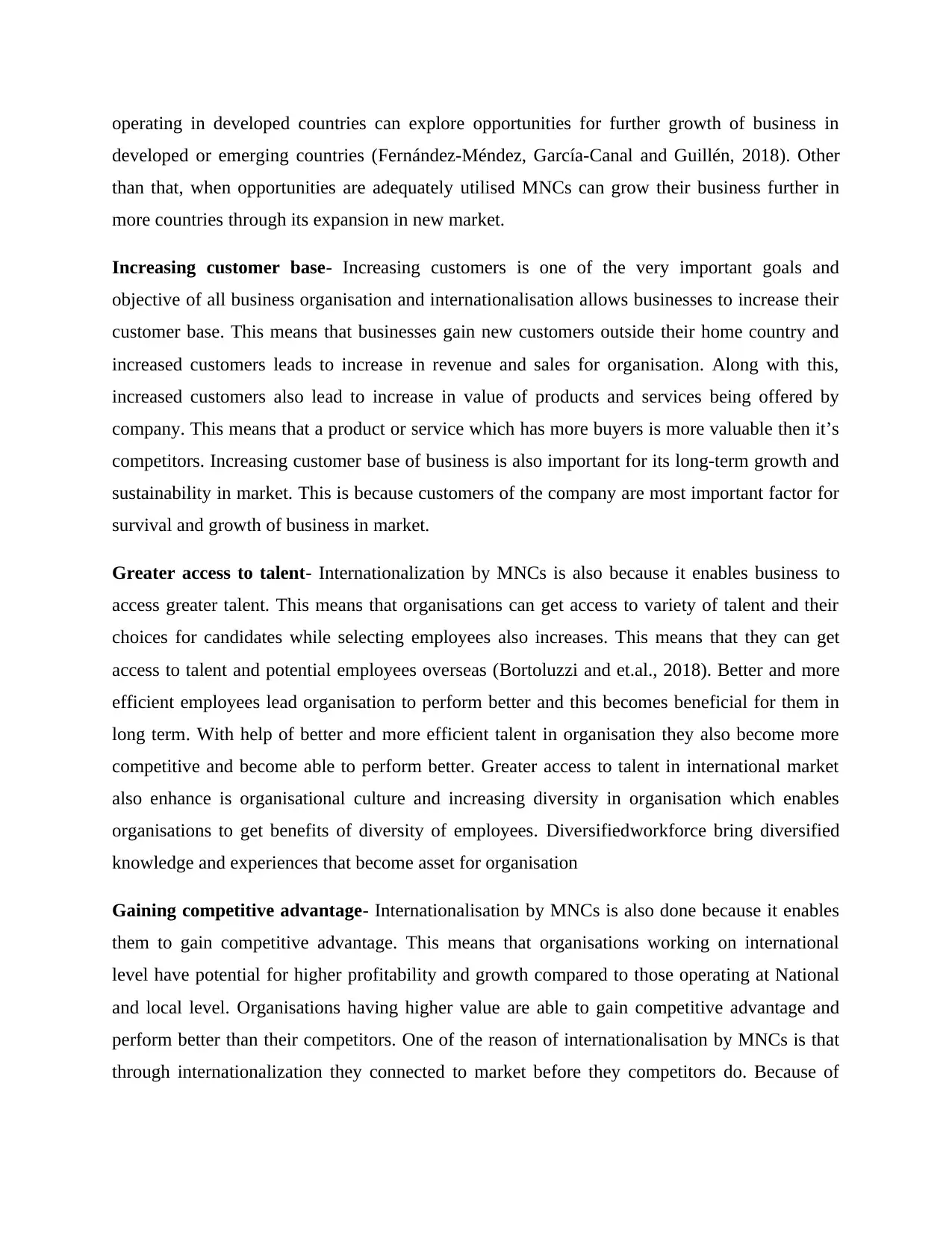
operating in developed countries can explore opportunities for further growth of business in
developed or emerging countries (Fernández-Méndez, García-Canal and Guillén, 2018). Other
than that, when opportunities are adequately utilised MNCs can grow their business further in
more countries through its expansion in new market.
Increasing customer base- Increasing customers is one of the very important goals and
objective of all business organisation and internationalisation allows businesses to increase their
customer base. This means that businesses gain new customers outside their home country and
increased customers leads to increase in revenue and sales for organisation. Along with this,
increased customers also lead to increase in value of products and services being offered by
company. This means that a product or service which has more buyers is more valuable then it’s
competitors. Increasing customer base of business is also important for its long-term growth and
sustainability in market. This is because customers of the company are most important factor for
survival and growth of business in market.
Greater access to talent- Internationalization by MNCs is also because it enables business to
access greater talent. This means that organisations can get access to variety of talent and their
choices for candidates while selecting employees also increases. This means that they can get
access to talent and potential employees overseas (Bortoluzzi and et.al., 2018). Better and more
efficient employees lead organisation to perform better and this becomes beneficial for them in
long term. With help of better and more efficient talent in organisation they also become more
competitive and become able to perform better. Greater access to talent in international market
also enhance is organisational culture and increasing diversity in organisation which enables
organisations to get benefits of diversity of employees. Diversifiedworkforce bring diversified
knowledge and experiences that become asset for organisation
Gaining competitive advantage- Internationalisation by MNCs is also done because it enables
them to gain competitive advantage. This means that organisations working on international
level have potential for higher profitability and growth compared to those operating at National
and local level. Organisations having higher value are able to gain competitive advantage and
perform better than their competitors. One of the reason of internationalisation by MNCs is that
through internationalization they connected to market before they competitors do. Because of
developed or emerging countries (Fernández-Méndez, García-Canal and Guillén, 2018). Other
than that, when opportunities are adequately utilised MNCs can grow their business further in
more countries through its expansion in new market.
Increasing customer base- Increasing customers is one of the very important goals and
objective of all business organisation and internationalisation allows businesses to increase their
customer base. This means that businesses gain new customers outside their home country and
increased customers leads to increase in revenue and sales for organisation. Along with this,
increased customers also lead to increase in value of products and services being offered by
company. This means that a product or service which has more buyers is more valuable then it’s
competitors. Increasing customer base of business is also important for its long-term growth and
sustainability in market. This is because customers of the company are most important factor for
survival and growth of business in market.
Greater access to talent- Internationalization by MNCs is also because it enables business to
access greater talent. This means that organisations can get access to variety of talent and their
choices for candidates while selecting employees also increases. This means that they can get
access to talent and potential employees overseas (Bortoluzzi and et.al., 2018). Better and more
efficient employees lead organisation to perform better and this becomes beneficial for them in
long term. With help of better and more efficient talent in organisation they also become more
competitive and become able to perform better. Greater access to talent in international market
also enhance is organisational culture and increasing diversity in organisation which enables
organisations to get benefits of diversity of employees. Diversifiedworkforce bring diversified
knowledge and experiences that become asset for organisation
Gaining competitive advantage- Internationalisation by MNCs is also done because it enables
them to gain competitive advantage. This means that organisations working on international
level have potential for higher profitability and growth compared to those operating at National
and local level. Organisations having higher value are able to gain competitive advantage and
perform better than their competitors. One of the reason of internationalisation by MNCs is that
through internationalization they connected to market before they competitors do. Because of
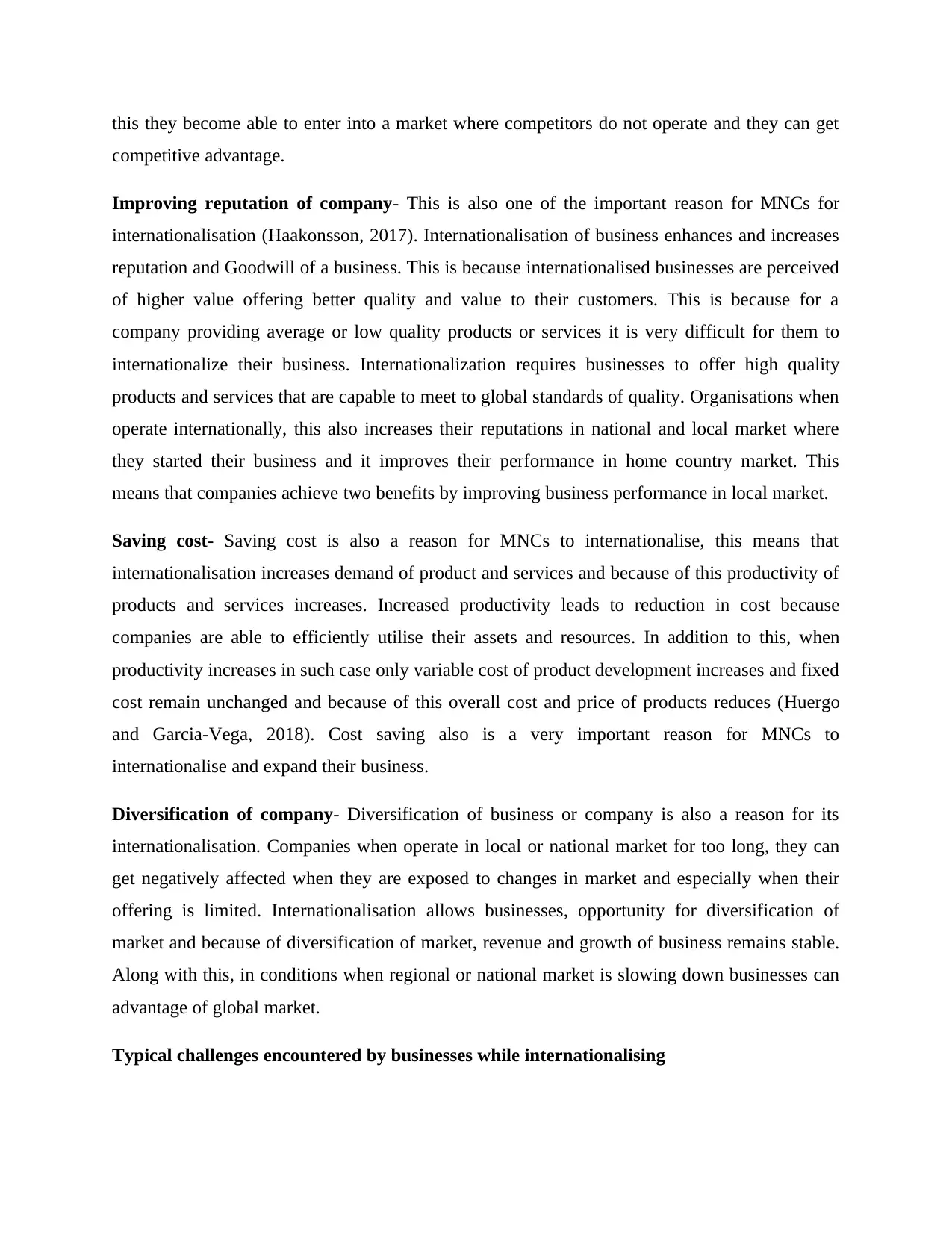
this they become able to enter into a market where competitors do not operate and they can get
competitive advantage.
Improving reputation of company- This is also one of the important reason for MNCs for
internationalisation (Haakonsson, 2017). Internationalisation of business enhances and increases
reputation and Goodwill of a business. This is because internationalised businesses are perceived
of higher value offering better quality and value to their customers. This is because for a
company providing average or low quality products or services it is very difficult for them to
internationalize their business. Internationalization requires businesses to offer high quality
products and services that are capable to meet to global standards of quality. Organisations when
operate internationally, this also increases their reputations in national and local market where
they started their business and it improves their performance in home country market. This
means that companies achieve two benefits by improving business performance in local market.
Saving cost- Saving cost is also a reason for MNCs to internationalise, this means that
internationalisation increases demand of product and services and because of this productivity of
products and services increases. Increased productivity leads to reduction in cost because
companies are able to efficiently utilise their assets and resources. In addition to this, when
productivity increases in such case only variable cost of product development increases and fixed
cost remain unchanged and because of this overall cost and price of products reduces (Huergo
and Garcia-Vega, 2018). Cost saving also is a very important reason for MNCs to
internationalise and expand their business.
Diversification of company- Diversification of business or company is also a reason for its
internationalisation. Companies when operate in local or national market for too long, they can
get negatively affected when they are exposed to changes in market and especially when their
offering is limited. Internationalisation allows businesses, opportunity for diversification of
market and because of diversification of market, revenue and growth of business remains stable.
Along with this, in conditions when regional or national market is slowing down businesses can
advantage of global market.
Typical challenges encountered by businesses while internationalising
competitive advantage.
Improving reputation of company- This is also one of the important reason for MNCs for
internationalisation (Haakonsson, 2017). Internationalisation of business enhances and increases
reputation and Goodwill of a business. This is because internationalised businesses are perceived
of higher value offering better quality and value to their customers. This is because for a
company providing average or low quality products or services it is very difficult for them to
internationalize their business. Internationalization requires businesses to offer high quality
products and services that are capable to meet to global standards of quality. Organisations when
operate internationally, this also increases their reputations in national and local market where
they started their business and it improves their performance in home country market. This
means that companies achieve two benefits by improving business performance in local market.
Saving cost- Saving cost is also a reason for MNCs to internationalise, this means that
internationalisation increases demand of product and services and because of this productivity of
products and services increases. Increased productivity leads to reduction in cost because
companies are able to efficiently utilise their assets and resources. In addition to this, when
productivity increases in such case only variable cost of product development increases and fixed
cost remain unchanged and because of this overall cost and price of products reduces (Huergo
and Garcia-Vega, 2018). Cost saving also is a very important reason for MNCs to
internationalise and expand their business.
Diversification of company- Diversification of business or company is also a reason for its
internationalisation. Companies when operate in local or national market for too long, they can
get negatively affected when they are exposed to changes in market and especially when their
offering is limited. Internationalisation allows businesses, opportunity for diversification of
market and because of diversification of market, revenue and growth of business remains stable.
Along with this, in conditions when regional or national market is slowing down businesses can
advantage of global market.
Typical challenges encountered by businesses while internationalising
⊘ This is a preview!⊘
Do you want full access?
Subscribe today to unlock all pages.

Trusted by 1+ million students worldwide
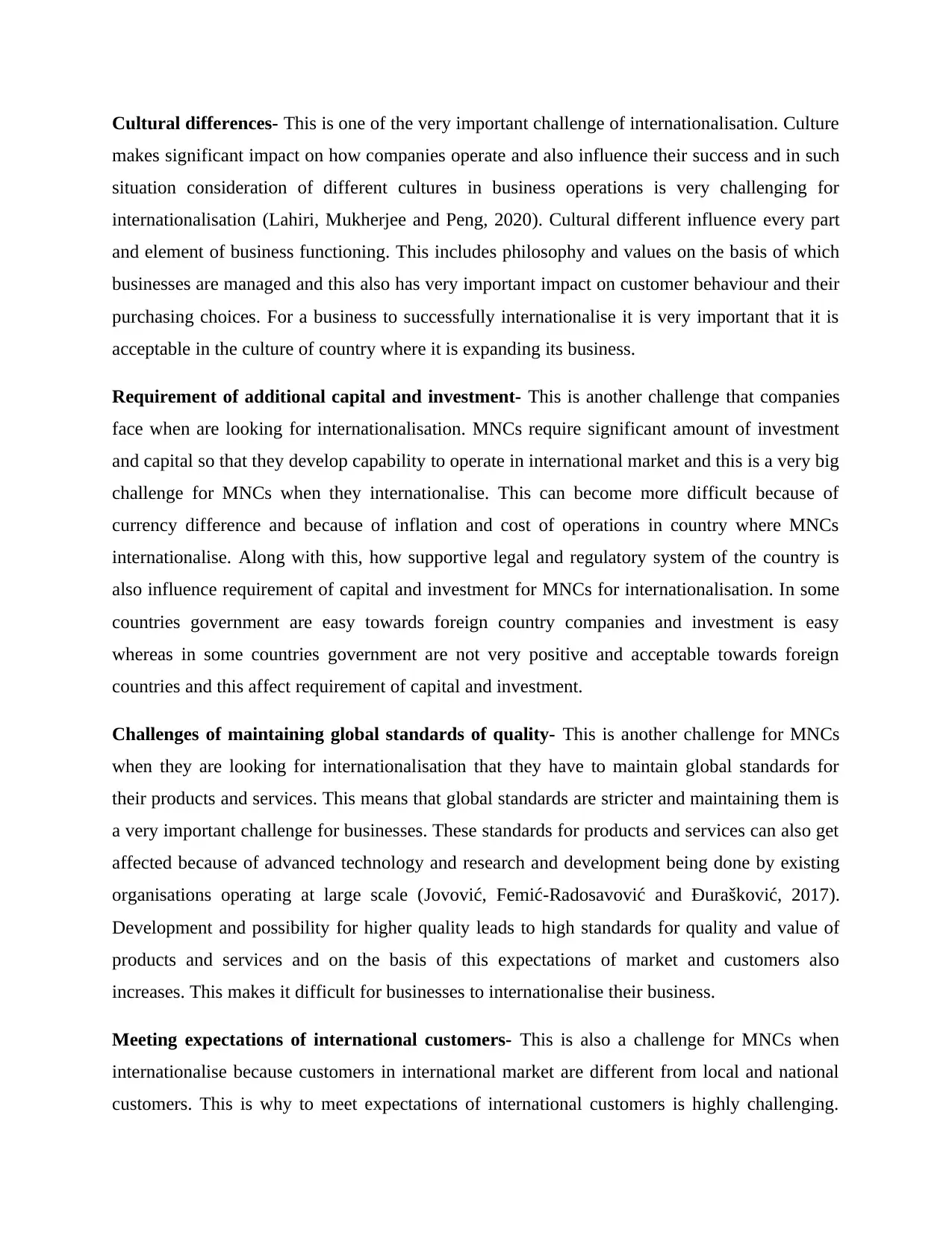
Cultural differences- This is one of the very important challenge of internationalisation. Culture
makes significant impact on how companies operate and also influence their success and in such
situation consideration of different cultures in business operations is very challenging for
internationalisation (Lahiri, Mukherjee and Peng, 2020). Cultural different influence every part
and element of business functioning. This includes philosophy and values on the basis of which
businesses are managed and this also has very important impact on customer behaviour and their
purchasing choices. For a business to successfully internationalise it is very important that it is
acceptable in the culture of country where it is expanding its business.
Requirement of additional capital and investment- This is another challenge that companies
face when are looking for internationalisation. MNCs require significant amount of investment
and capital so that they develop capability to operate in international market and this is a very big
challenge for MNCs when they internationalise. This can become more difficult because of
currency difference and because of inflation and cost of operations in country where MNCs
internationalise. Along with this, how supportive legal and regulatory system of the country is
also influence requirement of capital and investment for MNCs for internationalisation. In some
countries government are easy towards foreign country companies and investment is easy
whereas in some countries government are not very positive and acceptable towards foreign
countries and this affect requirement of capital and investment.
Challenges of maintaining global standards of quality- This is another challenge for MNCs
when they are looking for internationalisation that they have to maintain global standards for
their products and services. This means that global standards are stricter and maintaining them is
a very important challenge for businesses. These standards for products and services can also get
affected because of advanced technology and research and development being done by existing
organisations operating at large scale (Jovović, Femić-Radosavović and Ðurašković, 2017).
Development and possibility for higher quality leads to high standards for quality and value of
products and services and on the basis of this expectations of market and customers also
increases. This makes it difficult for businesses to internationalise their business.
Meeting expectations of international customers- This is also a challenge for MNCs when
internationalise because customers in international market are different from local and national
customers. This is why to meet expectations of international customers is highly challenging.
makes significant impact on how companies operate and also influence their success and in such
situation consideration of different cultures in business operations is very challenging for
internationalisation (Lahiri, Mukherjee and Peng, 2020). Cultural different influence every part
and element of business functioning. This includes philosophy and values on the basis of which
businesses are managed and this also has very important impact on customer behaviour and their
purchasing choices. For a business to successfully internationalise it is very important that it is
acceptable in the culture of country where it is expanding its business.
Requirement of additional capital and investment- This is another challenge that companies
face when are looking for internationalisation. MNCs require significant amount of investment
and capital so that they develop capability to operate in international market and this is a very big
challenge for MNCs when they internationalise. This can become more difficult because of
currency difference and because of inflation and cost of operations in country where MNCs
internationalise. Along with this, how supportive legal and regulatory system of the country is
also influence requirement of capital and investment for MNCs for internationalisation. In some
countries government are easy towards foreign country companies and investment is easy
whereas in some countries government are not very positive and acceptable towards foreign
countries and this affect requirement of capital and investment.
Challenges of maintaining global standards of quality- This is another challenge for MNCs
when they are looking for internationalisation that they have to maintain global standards for
their products and services. This means that global standards are stricter and maintaining them is
a very important challenge for businesses. These standards for products and services can also get
affected because of advanced technology and research and development being done by existing
organisations operating at large scale (Jovović, Femić-Radosavović and Ðurašković, 2017).
Development and possibility for higher quality leads to high standards for quality and value of
products and services and on the basis of this expectations of market and customers also
increases. This makes it difficult for businesses to internationalise their business.
Meeting expectations of international customers- This is also a challenge for MNCs when
internationalise because customers in international market are different from local and national
customers. This is why to meet expectations of international customers is highly challenging.
Paraphrase This Document
Need a fresh take? Get an instant paraphrase of this document with our AI Paraphraser
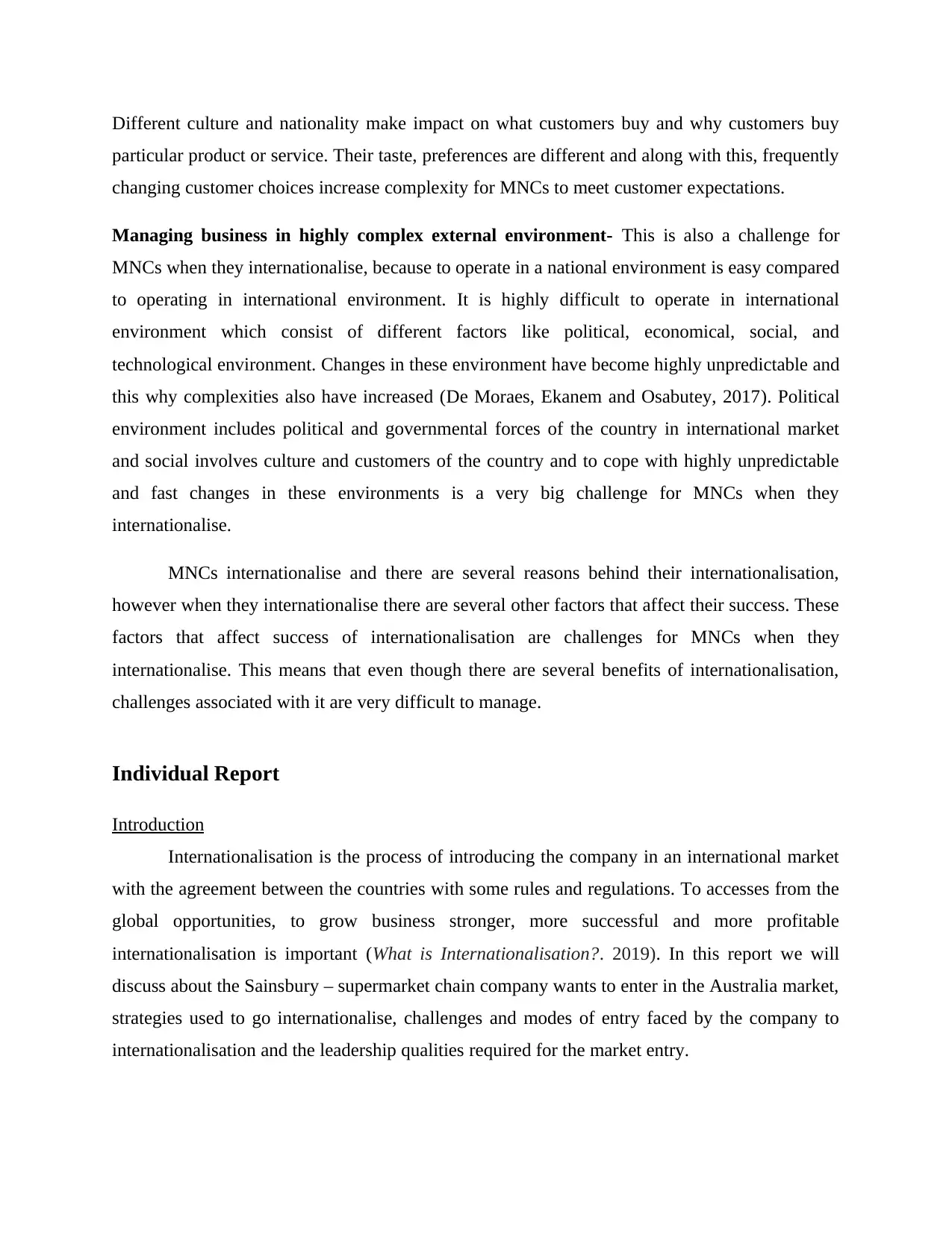
Different culture and nationality make impact on what customers buy and why customers buy
particular product or service. Their taste, preferences are different and along with this, frequently
changing customer choices increase complexity for MNCs to meet customer expectations.
Managing business in highly complex external environment- This is also a challenge for
MNCs when they internationalise, because to operate in a national environment is easy compared
to operating in international environment. It is highly difficult to operate in international
environment which consist of different factors like political, economical, social, and
technological environment. Changes in these environment have become highly unpredictable and
this why complexities also have increased (De Moraes, Ekanem and Osabutey, 2017). Political
environment includes political and governmental forces of the country in international market
and social involves culture and customers of the country and to cope with highly unpredictable
and fast changes in these environments is a very big challenge for MNCs when they
internationalise.
MNCs internationalise and there are several reasons behind their internationalisation,
however when they internationalise there are several other factors that affect their success. These
factors that affect success of internationalisation are challenges for MNCs when they
internationalise. This means that even though there are several benefits of internationalisation,
challenges associated with it are very difficult to manage.
Individual Report
Introduction
Internationalisation is the process of introducing the company in an international market
with the agreement between the countries with some rules and regulations. To accesses from the
global opportunities, to grow business stronger, more successful and more profitable
internationalisation is important (What is Internationalisation?. 2019). In this report we will
discuss about the Sainsbury – supermarket chain company wants to enter in the Australia market,
strategies used to go internationalise, challenges and modes of entry faced by the company to
internationalisation and the leadership qualities required for the market entry.
particular product or service. Their taste, preferences are different and along with this, frequently
changing customer choices increase complexity for MNCs to meet customer expectations.
Managing business in highly complex external environment- This is also a challenge for
MNCs when they internationalise, because to operate in a national environment is easy compared
to operating in international environment. It is highly difficult to operate in international
environment which consist of different factors like political, economical, social, and
technological environment. Changes in these environment have become highly unpredictable and
this why complexities also have increased (De Moraes, Ekanem and Osabutey, 2017). Political
environment includes political and governmental forces of the country in international market
and social involves culture and customers of the country and to cope with highly unpredictable
and fast changes in these environments is a very big challenge for MNCs when they
internationalise.
MNCs internationalise and there are several reasons behind their internationalisation,
however when they internationalise there are several other factors that affect their success. These
factors that affect success of internationalisation are challenges for MNCs when they
internationalise. This means that even though there are several benefits of internationalisation,
challenges associated with it are very difficult to manage.
Individual Report
Introduction
Internationalisation is the process of introducing the company in an international market
with the agreement between the countries with some rules and regulations. To accesses from the
global opportunities, to grow business stronger, more successful and more profitable
internationalisation is important (What is Internationalisation?. 2019). In this report we will
discuss about the Sainsbury – supermarket chain company wants to enter in the Australia market,
strategies used to go internationalise, challenges and modes of entry faced by the company to
internationalisation and the leadership qualities required for the market entry.
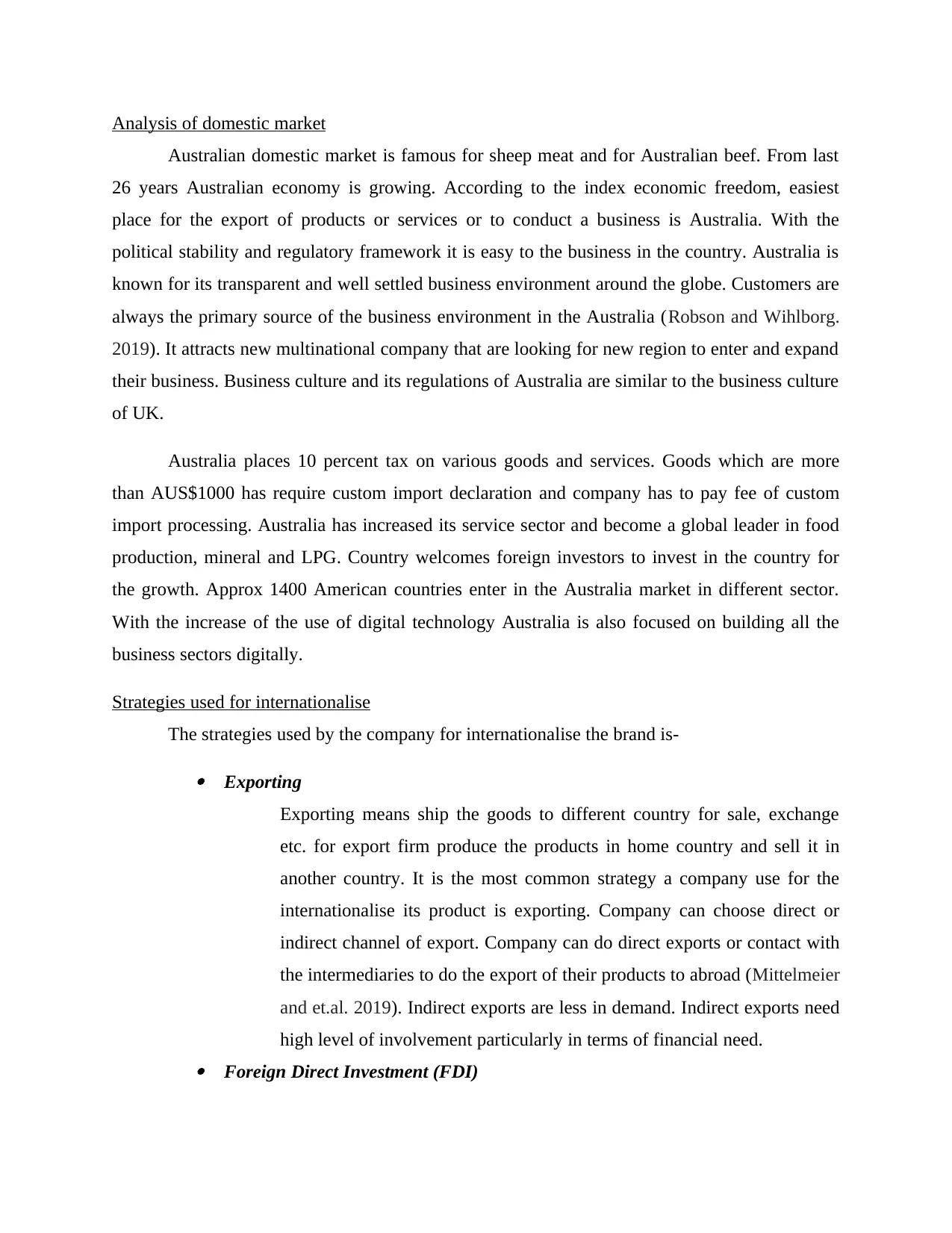
Analysis of domestic market
Australian domestic market is famous for sheep meat and for Australian beef. From last
26 years Australian economy is growing. According to the index economic freedom, easiest
place for the export of products or services or to conduct a business is Australia. With the
political stability and regulatory framework it is easy to the business in the country. Australia is
known for its transparent and well settled business environment around the globe. Customers are
always the primary source of the business environment in the Australia (Robson and Wihlborg.
2019). It attracts new multinational company that are looking for new region to enter and expand
their business. Business culture and its regulations of Australia are similar to the business culture
of UK.
Australia places 10 percent tax on various goods and services. Goods which are more
than AUS$1000 has require custom import declaration and company has to pay fee of custom
import processing. Australia has increased its service sector and become a global leader in food
production, mineral and LPG. Country welcomes foreign investors to invest in the country for
the growth. Approx 1400 American countries enter in the Australia market in different sector.
With the increase of the use of digital technology Australia is also focused on building all the
business sectors digitally.
Strategies used for internationalise
The strategies used by the company for internationalise the brand is- Exporting
Exporting means ship the goods to different country for sale, exchange
etc. for export firm produce the products in home country and sell it in
another country. It is the most common strategy a company use for the
internationalise its product is exporting. Company can choose direct or
indirect channel of export. Company can do direct exports or contact with
the intermediaries to do the export of their products to abroad (Mittelmeier
and et.al. 2019). Indirect exports are less in demand. Indirect exports need
high level of involvement particularly in terms of financial need.
Foreign Direct Investment (FDI)
Australian domestic market is famous for sheep meat and for Australian beef. From last
26 years Australian economy is growing. According to the index economic freedom, easiest
place for the export of products or services or to conduct a business is Australia. With the
political stability and regulatory framework it is easy to the business in the country. Australia is
known for its transparent and well settled business environment around the globe. Customers are
always the primary source of the business environment in the Australia (Robson and Wihlborg.
2019). It attracts new multinational company that are looking for new region to enter and expand
their business. Business culture and its regulations of Australia are similar to the business culture
of UK.
Australia places 10 percent tax on various goods and services. Goods which are more
than AUS$1000 has require custom import declaration and company has to pay fee of custom
import processing. Australia has increased its service sector and become a global leader in food
production, mineral and LPG. Country welcomes foreign investors to invest in the country for
the growth. Approx 1400 American countries enter in the Australia market in different sector.
With the increase of the use of digital technology Australia is also focused on building all the
business sectors digitally.
Strategies used for internationalise
The strategies used by the company for internationalise the brand is- Exporting
Exporting means ship the goods to different country for sale, exchange
etc. for export firm produce the products in home country and sell it in
another country. It is the most common strategy a company use for the
internationalise its product is exporting. Company can choose direct or
indirect channel of export. Company can do direct exports or contact with
the intermediaries to do the export of their products to abroad (Mittelmeier
and et.al. 2019). Indirect exports are less in demand. Indirect exports need
high level of involvement particularly in terms of financial need.
Foreign Direct Investment (FDI)
⊘ This is a preview!⊘
Do you want full access?
Subscribe today to unlock all pages.

Trusted by 1+ million students worldwide
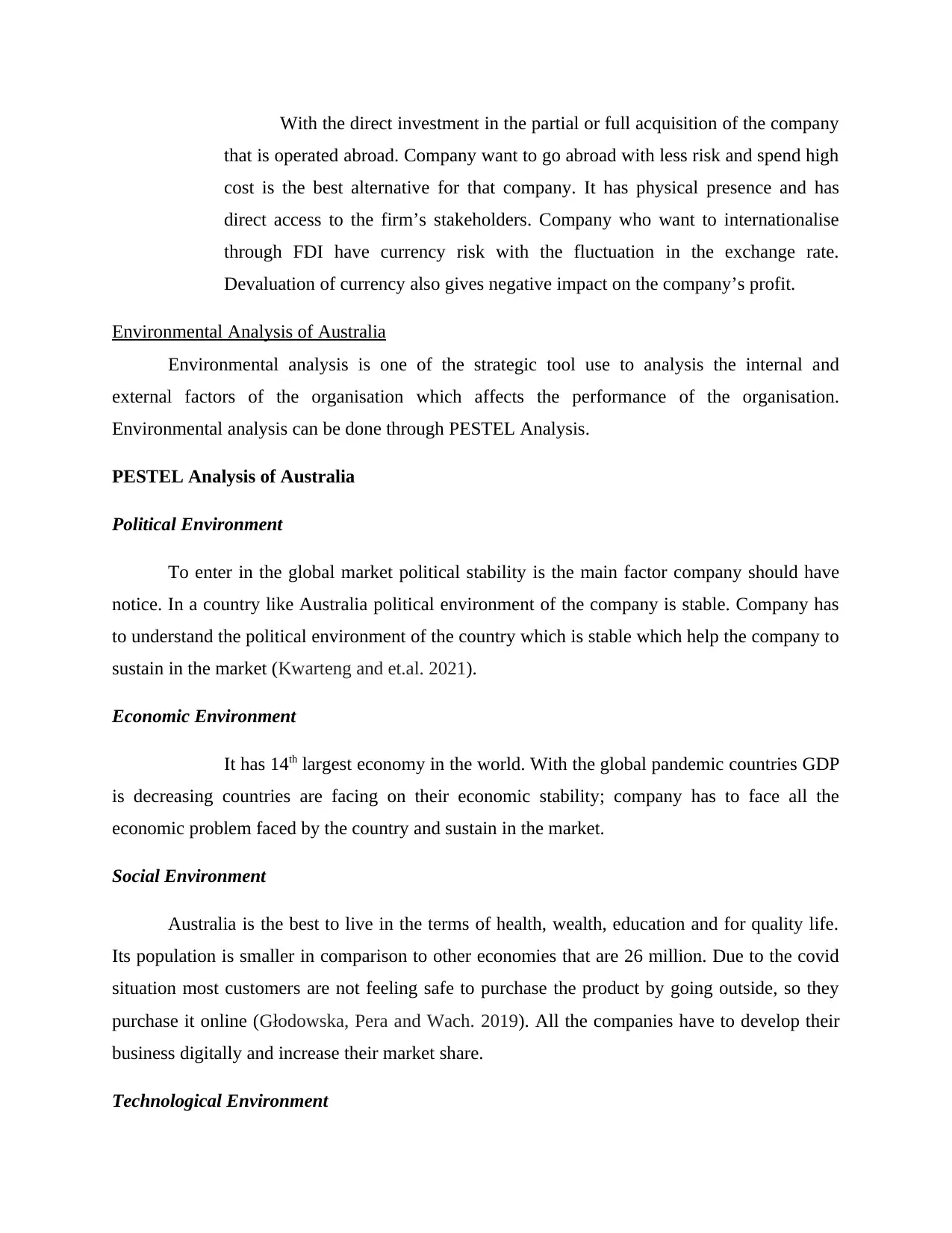
With the direct investment in the partial or full acquisition of the company
that is operated abroad. Company want to go abroad with less risk and spend high
cost is the best alternative for that company. It has physical presence and has
direct access to the firm’s stakeholders. Company who want to internationalise
through FDI have currency risk with the fluctuation in the exchange rate.
Devaluation of currency also gives negative impact on the company’s profit.
Environmental Analysis of Australia
Environmental analysis is one of the strategic tool use to analysis the internal and
external factors of the organisation which affects the performance of the organisation.
Environmental analysis can be done through PESTEL Analysis.
PESTEL Analysis of Australia
Political Environment
To enter in the global market political stability is the main factor company should have
notice. In a country like Australia political environment of the company is stable. Company has
to understand the political environment of the country which is stable which help the company to
sustain in the market (Kwarteng and et.al. 2021).
Economic Environment
It has 14th largest economy in the world. With the global pandemic countries GDP
is decreasing countries are facing on their economic stability; company has to face all the
economic problem faced by the country and sustain in the market.
Social Environment
Australia is the best to live in the terms of health, wealth, education and for quality life.
Its population is smaller in comparison to other economies that are 26 million. Due to the covid
situation most customers are not feeling safe to purchase the product by going outside, so they
purchase it online (Głodowska, Pera and Wach. 2019). All the companies have to develop their
business digitally and increase their market share.
Technological Environment
that is operated abroad. Company want to go abroad with less risk and spend high
cost is the best alternative for that company. It has physical presence and has
direct access to the firm’s stakeholders. Company who want to internationalise
through FDI have currency risk with the fluctuation in the exchange rate.
Devaluation of currency also gives negative impact on the company’s profit.
Environmental Analysis of Australia
Environmental analysis is one of the strategic tool use to analysis the internal and
external factors of the organisation which affects the performance of the organisation.
Environmental analysis can be done through PESTEL Analysis.
PESTEL Analysis of Australia
Political Environment
To enter in the global market political stability is the main factor company should have
notice. In a country like Australia political environment of the company is stable. Company has
to understand the political environment of the country which is stable which help the company to
sustain in the market (Kwarteng and et.al. 2021).
Economic Environment
It has 14th largest economy in the world. With the global pandemic countries GDP
is decreasing countries are facing on their economic stability; company has to face all the
economic problem faced by the country and sustain in the market.
Social Environment
Australia is the best to live in the terms of health, wealth, education and for quality life.
Its population is smaller in comparison to other economies that are 26 million. Due to the covid
situation most customers are not feeling safe to purchase the product by going outside, so they
purchase it online (Głodowska, Pera and Wach. 2019). All the companies have to develop their
business digitally and increase their market share.
Technological Environment
Paraphrase This Document
Need a fresh take? Get an instant paraphrase of this document with our AI Paraphraser
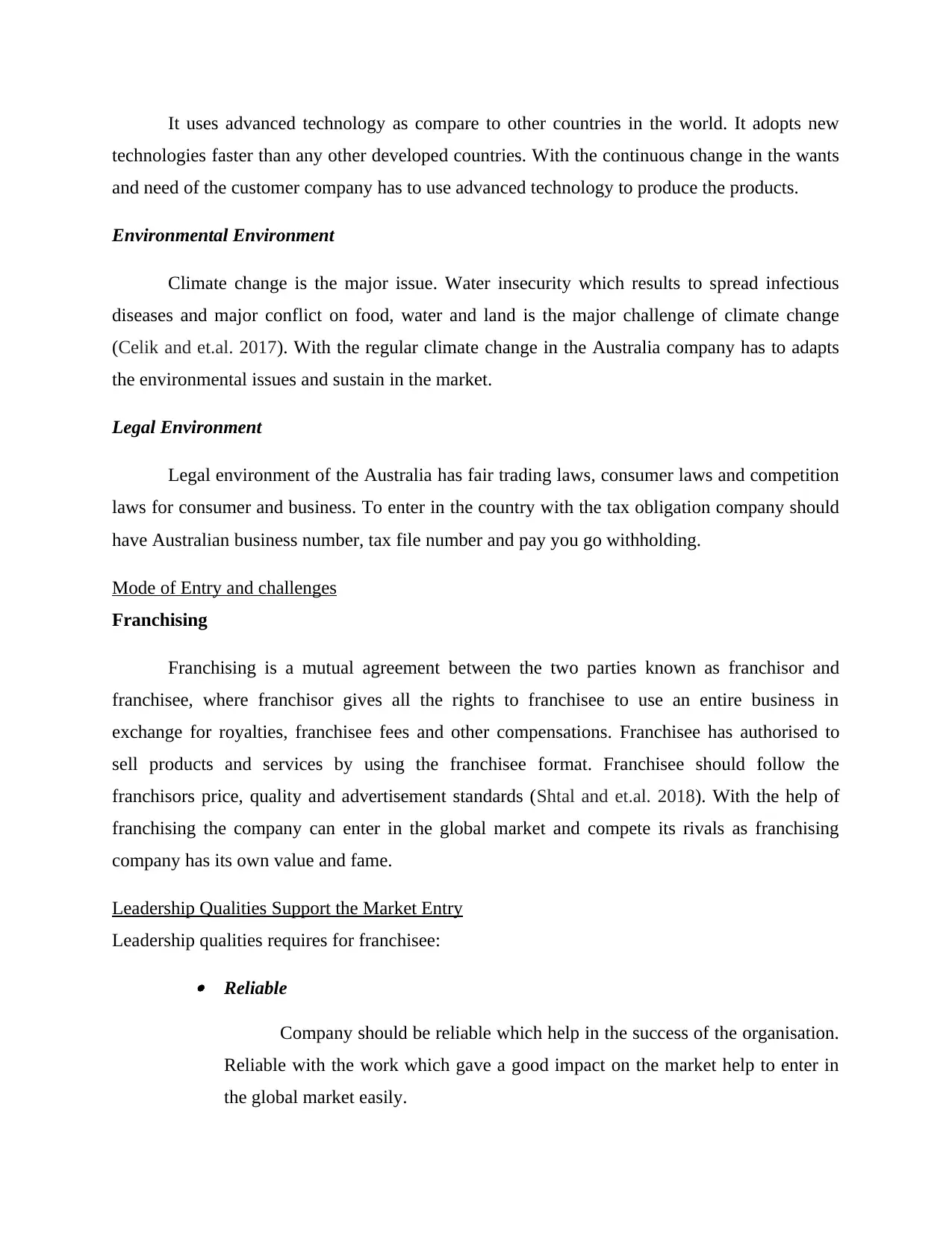
It uses advanced technology as compare to other countries in the world. It adopts new
technologies faster than any other developed countries. With the continuous change in the wants
and need of the customer company has to use advanced technology to produce the products.
Environmental Environment
Climate change is the major issue. Water insecurity which results to spread infectious
diseases and major conflict on food, water and land is the major challenge of climate change
(Celik and et.al. 2017). With the regular climate change in the Australia company has to adapts
the environmental issues and sustain in the market.
Legal Environment
Legal environment of the Australia has fair trading laws, consumer laws and competition
laws for consumer and business. To enter in the country with the tax obligation company should
have Australian business number, tax file number and pay you go withholding.
Mode of Entry and challenges
Franchising
Franchising is a mutual agreement between the two parties known as franchisor and
franchisee, where franchisor gives all the rights to franchisee to use an entire business in
exchange for royalties, franchisee fees and other compensations. Franchisee has authorised to
sell products and services by using the franchisee format. Franchisee should follow the
franchisors price, quality and advertisement standards (Shtal and et.al. 2018). With the help of
franchising the company can enter in the global market and compete its rivals as franchising
company has its own value and fame.
Leadership Qualities Support the Market Entry
Leadership qualities requires for franchisee: Reliable
Company should be reliable which help in the success of the organisation.
Reliable with the work which gave a good impact on the market help to enter in
the global market easily.
technologies faster than any other developed countries. With the continuous change in the wants
and need of the customer company has to use advanced technology to produce the products.
Environmental Environment
Climate change is the major issue. Water insecurity which results to spread infectious
diseases and major conflict on food, water and land is the major challenge of climate change
(Celik and et.al. 2017). With the regular climate change in the Australia company has to adapts
the environmental issues and sustain in the market.
Legal Environment
Legal environment of the Australia has fair trading laws, consumer laws and competition
laws for consumer and business. To enter in the country with the tax obligation company should
have Australian business number, tax file number and pay you go withholding.
Mode of Entry and challenges
Franchising
Franchising is a mutual agreement between the two parties known as franchisor and
franchisee, where franchisor gives all the rights to franchisee to use an entire business in
exchange for royalties, franchisee fees and other compensations. Franchisee has authorised to
sell products and services by using the franchisee format. Franchisee should follow the
franchisors price, quality and advertisement standards (Shtal and et.al. 2018). With the help of
franchising the company can enter in the global market and compete its rivals as franchising
company has its own value and fame.
Leadership Qualities Support the Market Entry
Leadership qualities requires for franchisee: Reliable
Company should be reliable which help in the success of the organisation.
Reliable with the work which gave a good impact on the market help to enter in
the global market easily.
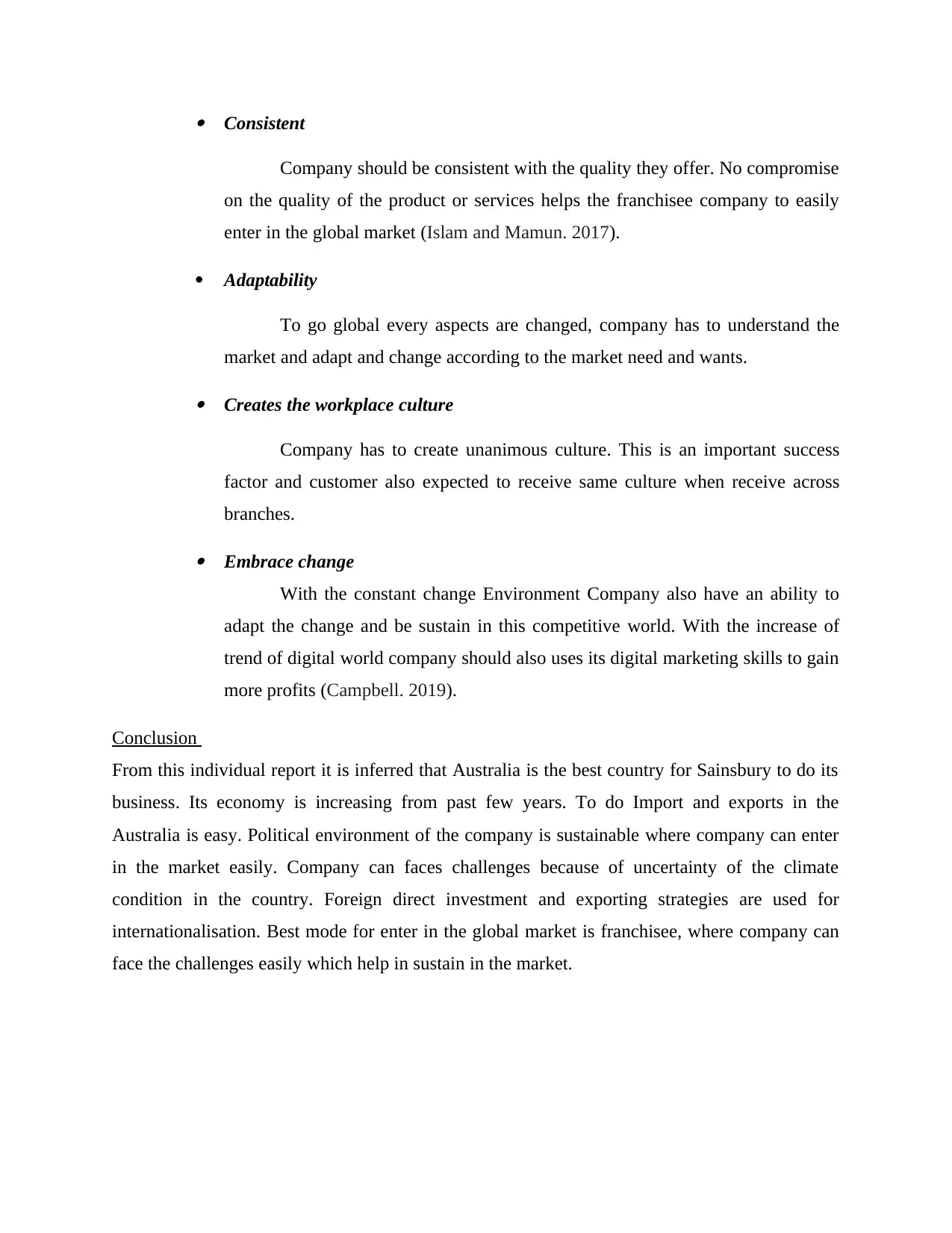
Consistent
Company should be consistent with the quality they offer. No compromise
on the quality of the product or services helps the franchisee company to easily
enter in the global market (Islam and Mamun. 2017).
Adaptability
To go global every aspects are changed, company has to understand the
market and adapt and change according to the market need and wants. Creates the workplace culture
Company has to create unanimous culture. This is an important success
factor and customer also expected to receive same culture when receive across
branches. Embrace change
With the constant change Environment Company also have an ability to
adapt the change and be sustain in this competitive world. With the increase of
trend of digital world company should also uses its digital marketing skills to gain
more profits (Campbell. 2019).
Conclusion
From this individual report it is inferred that Australia is the best country for Sainsbury to do its
business. Its economy is increasing from past few years. To do Import and exports in the
Australia is easy. Political environment of the company is sustainable where company can enter
in the market easily. Company can faces challenges because of uncertainty of the climate
condition in the country. Foreign direct investment and exporting strategies are used for
internationalisation. Best mode for enter in the global market is franchisee, where company can
face the challenges easily which help in sustain in the market.
Company should be consistent with the quality they offer. No compromise
on the quality of the product or services helps the franchisee company to easily
enter in the global market (Islam and Mamun. 2017).
Adaptability
To go global every aspects are changed, company has to understand the
market and adapt and change according to the market need and wants. Creates the workplace culture
Company has to create unanimous culture. This is an important success
factor and customer also expected to receive same culture when receive across
branches. Embrace change
With the constant change Environment Company also have an ability to
adapt the change and be sustain in this competitive world. With the increase of
trend of digital world company should also uses its digital marketing skills to gain
more profits (Campbell. 2019).
Conclusion
From this individual report it is inferred that Australia is the best country for Sainsbury to do its
business. Its economy is increasing from past few years. To do Import and exports in the
Australia is easy. Political environment of the company is sustainable where company can enter
in the market easily. Company can faces challenges because of uncertainty of the climate
condition in the country. Foreign direct investment and exporting strategies are used for
internationalisation. Best mode for enter in the global market is franchisee, where company can
face the challenges easily which help in sustain in the market.
⊘ This is a preview!⊘
Do you want full access?
Subscribe today to unlock all pages.

Trusted by 1+ million students worldwide
1 out of 17
Related Documents
Your All-in-One AI-Powered Toolkit for Academic Success.
+13062052269
info@desklib.com
Available 24*7 on WhatsApp / Email
![[object Object]](/_next/static/media/star-bottom.7253800d.svg)
Unlock your academic potential
Copyright © 2020–2026 A2Z Services. All Rights Reserved. Developed and managed by ZUCOL.





